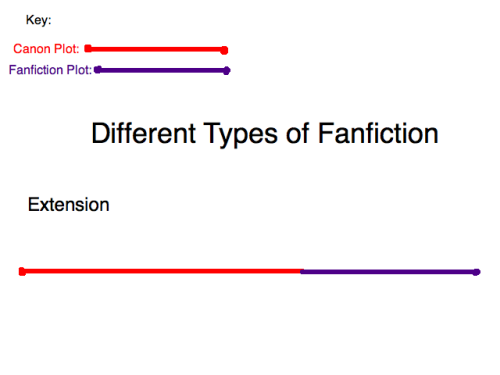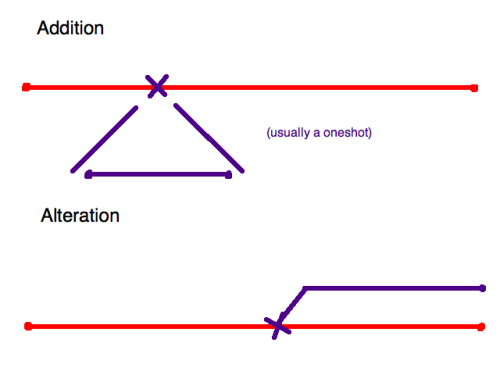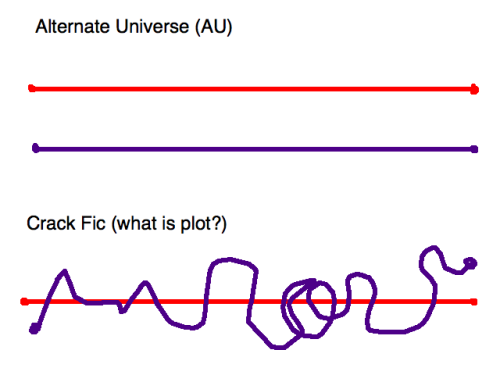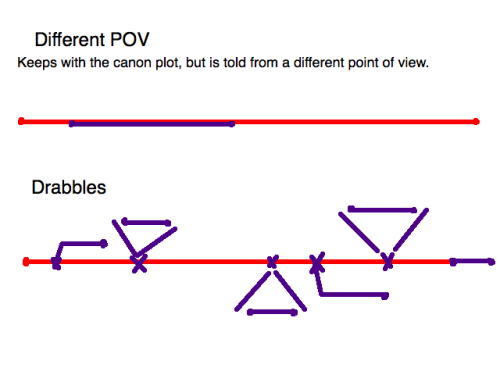Let Writing Empower You
Let writing empower you
Writing is a form of empowerment. The act of creating a world in which you have ultimate control can be an incredibly cathartic and joyful experience.
If you get overwhelmed or blocked, just remember that you have the power. You get to mould the world and its characters into whatever shape brings you the greatest satisfaction.
More Posts from Worldwatcher-d and Others

Been thinking about this a lot lately... It's especially good advice for those of us that are terrible plotters. Just take it one step at a time.
the WORLD needs your writing
have *you* ever seen writing "advice" that mistakes harshness for honesty and punches in the gut for powerful points, and then tells you if you are not constantly, every day, scorching the earth on which you walk with your fiery passion for words - then you are not a writer?
I have! And it really gets to me when I see someone tear other people down rather than build them up, extinguish their lights for being more candles in the dark than nuclear bombs dropped from the sky, who would risk there being more misery rather than cultivate the joy of creating and sharing emotions, ideas, worlds...
So I wrote a post on why YOUR (whoever is reading this right now) writing is needed by the world, as long as it is in that spirit of deep connection and creativity that stretches beyond time and space and can outlive you by several orders of magnitude
I actually strongly take issue with "No one needs your writing". It's not just extremely discouraging and depressing, and turning away a lot of people for not burning with passion at temperatures of the sun, but very likely also just wrong.
Someone out there is missing out on a smile in a torrent of misery, a feeling of connection in a sea of loneliness, a moment of peace in what feels like an eternity of hurt. They won't have that moment of bliss, maybe their day saved, or even entire life changed for the better.
People sometimes think this is reserved to some small group of particularly good writers, that everyone else is foolish to think that anyone can have a big influence on anyone. And it's impossible to predict.
It can be in the most unexpected ways: a random fanfic touching someone's heart because they happen to address a very particular grief or longing that is unlikely to ever be published with characters that feel like family, a small poem providing strength at the hardest moments because it used language that resonated with a reader on a niche subject, an autobiographical story inspiring someone to a new, ethical life... there are so many possibilities.
And I know this *because I am talking from experience*. So many fanfics have let me imagine other lives that could be my own, made me see from new perspectives, awakened hidden feelings or mollified pain, formed the basis of years of friendships and self-discovery, or just opened me up to so many new genres of writing. So many random stories of people, imagined or of this Earth, that bring a light to the darkness of apathy, aloneness, and angst that threaten to engulf so many in the world.
And vice versa, I have been told that my writing (not published, not even getting 10 likes on Tumblr or Ao3!) has inspired some people, been "exactly the right amount of humorous" or even that one line I wrote was the best one they had ever read.
PLEASE, WRITE YOUR THING! FOR everyone whose life might be saved by it, even if just a bit.
Once more for the fanfic writers...
There is no wrong or right way of doing this fanfic-writing thing. Free yourself in 2025 by embracing whatever sort of writer you are.
If you can only post a story once a year or you want to post everyday, it's okay.
Whether you can only write drabbles or 100k stuff, it's okay.
Maybe your strength lies in writing fantasy, or romance or adventure, or non graphic smut, or omergaverse, or whatever kinky stuff there is out there, or comedy, or musical, medieval stuff, etc., it's okay.
Whether you're in a large or a tiny fandom, it's okay.
There is an audience for everything and everyone. It's not possible to dip one's toes in everything. Things can be learned and you can diversify if you really want to do more things with your writing. There is no gun to your head though. Even our favorite artists aren't good at everything.
It seems like recently there is so much pressure on fanfic writers to write certain stuff, in a certain way and for certain fandoms.
Let's not forget that from the get-go fanfic-writing is a FUN HOBBY and hence the secret is for you to write what you want to write, how you want to write it, when you want to write it and for whatever fandom you love.
Tips for writing dream sequences (from someone who has really vivid, weird dreams on a frequent basis)
My biggest pet peeve with fictional dream sequences is that they make too much sense!! They're too relevant! There's not enough random crazy stuff! That's not always unrealistic per se, but you are missing out on some of the fun ways you can reveal information about your character's mindset, fears, struggles, and future.
Most of my dreams have a goal or objective driving the plot, and it's usually urgent. Ex. "escape the huge storm on the horizon", "find a place to sleep for the night in an unfamiliar town", "find a bathroom". This is especially true of stress dreams.
Everything going on in the dream makes perfect sense to you during the dream. It doesn't feel like reality per se, but you think it is. You're living in a house full of vampires that could eat you at any moment? Seems legit.
Emotions and situations from the dreamer's life can/will find their way into dreams, with varying levels of subtlety. The dream could be about the stressful event itself, or it could be some sort of exaggerated metaphor. Ex. I was worried about whether I was a competent CS major while I was still trying to find a summer job/internship, and I was worried about what my professors must think of me. Such a good student on paper, still without summer plans. I dreamed that I ran into my professors all having lunch together at a restaurant (during a dream with a completely different storyline), and I was wearing my pajamas. They judged me.
Certain things are very hard to do in dreams. This could vary from person to person. For me, it's always driving (the brakes never work right), flying (I can't stay off the ground for very long), and running (it's like trying to run through waist-deep water).
People with PTSD may dream about the traumatic event happening differently than it actually happened. (Take this one with a grain of salt - I don't suffer from PTSD, I just research it sometimes so my blorbos can suffer accurately).
You can have a string of loosely connected or disconnected dream sequences back to back, each with an entirely different plot, setting, etc.
People can have reoccurring themes or plotlines in their dreams, which are often connected to their lives/psyche somehow. I frequently dream about running away from tornadoes and being in situations where there's some catastrophe coming but I'm the only one who understands that there's a problem and nobody will listen to me.
It's common for me to have a dream setting that I KNOW is someplace I'm familiar with, but it doesn't actually look like that place at all. Ex. "I dreamed that we were at my house, but it didn't look like my house..."
Dreams can end in cliffhangers. Sometimes I wake up right before I'm about to eat something delicious.
Sometimes people have dreams about doing things that they would never, ever do in real life, and they wake up feeling disgusted. This is Not a manifestation of their secret desires (*glares at Freud*).
Images are the most memorable parts of dreams. I forget the specific plot points, but I can still picture dozens of liminal spaces my brain has created, even years after I dreamed about it.
Dreams will fade from memory very quickly unless the dream had a strong impression on you, you write details about it down or you tell someone about it before you forget.
If you realize you're dreaming during your dream, sometimes you can control the dream going forward. This is called lucid dreaming. I've done it accidentally a couple times, and it's really hard to "hold on" to the dream and control it. I usually wake up soon after starting. With practice, you can get better at it.
Sometimes a normal/good dream can turn into a nightmare, and vice versa. Most of my dreams aren't really good or bad, they're something in between.
Your subconscious brain is CRAZY intuitive. We can argue over the existence of prophetic dreams (I've heard so many crazy stories), but at the end of the day, your subconscious brain knows things that you don't consciously know. If your character is in love with someone, their subconscious brain will know even if the character doesn't. Relationship problems? Deepest darkest fears and insecurities? Your brain knows. A dream predicted the downfall of my first relationship eight months before it happened, down to the reason why we failed. You can absolutely foreshadow this way. A character might subconsciously know what the consequences of their or other people's actions will be, understand things about the situation they're in, know things about the people they're interacting with, and more, despite their conscious realizations.
There are plenty of ways to make a dream sequence relevant to your story, but don't forget to add in some fun, random details. Character A is secretly in love with Character B? Have Character A dream about Character B confessing feelings to them while in a Vine Nostalgia themed restaurant over a plate of mac-n-cheese. The details are the fun part, and you can get as weird as you want. I once ran into my aunt in a dream, and she was wearing a backpack with a bunch of (fake?) hands sticking out of it, making a fan that rose above her back behind her head like some sort of peacock feather costume piece. I was so freaked out that I woke up. I dare you to get weirder than that.
Not everyone's brain works the same way. I have vivid, random, detailed, memorable dreams on a frequent basis. When I describe them to people they often ask "what were you on?". My roommate only remembers her dreams when they're nightmares. I have some friends who say they don't dream. Other friends have really boring, mundane dreams about their normal lives. Some people have weird dreams but only once in a blue moon. It's a good idea to decide off the bat what kinds of dreams your character has, and how often they remember them.
That's it for now, but I might make a part two if I think of more things to add. Feel free to reblog with your own personal dream expertise!
It is the duty of a writer to give to others the stories they never had themselves. The stories they needed to hear but no one was willing to tell.
Ways to un-stick a stuck story
Do an outline, whatever way works best. Get yourself out of the word soup and know where the story is headed.
Conflicts and obstacles. Hurt the protagonist, put things in their way, this keeps the story interesting. An easy journey makes the story boring and boring is hard to write.
Change the POV. Sometimes all it takes to untangle a knotted story is to look at it through different eyes, be it through the sidekick, the antagonist, a minor character, whatever.
Know the characters. You can’t write a story if the characters are strangers to you. Know their likes, dislikes, fears, and most importantly, their motivation. This makes the path clearer.
Fill in holes. Writing doesn’t have to be linear; you can always go back and fill in plotholes, and add content and context.
Have flashbacks, hallucinations, dream sequences or foreshadowing events. These stir the story up, deviations from the expected course add a feeling of urgency and uncertainty to the narrative.
Introduce a new mystery. If there’s something that just doesn’t add up, a big question mark, the story becomes more compelling. Beware: this can also cause you to sink further into the mire.
Take something from your protagonist. A weapon, asset, ally or loved one. Force him to operate without it, it can reinvigorate a stale story.
Twists and betrayal. Maybe someone isn’t who they say they are or the protagonist is betrayed by someone he thought he could trust. This can shake the story up and get it rolling again.
Secrets. If someone has a deep, dark secret that they’re forced to lie about, it’s a good way to stir up some fresh conflict. New lies to cover up the old ones, the secret being revealed, and all the resulting chaos.
Kill someone. Make a character death that is productive to the plot, but not “just because”. If done well, it affects all the characters, stirs up the story and gets it moving.
Ill-advised character actions. Tension is created when a character we love does something we hate. Identify the thing the readers don’t want to happen, then engineer it so it happens worse than they imagined.
Create cliff-hangers. Keep the readers’ attention by putting the characters into new problems and make them wait for you to write your way out of it. This challenge can really bring out your creativity.
Raise the stakes. Make the consequences of failure worse, make the journey harder. Suddenly the protagonist’s goal is more than he expected, or he has to make an important choice.
Make the hero active. You can’t always wait for external influences on the characters, sometimes you have to make the hero take actions himself. Not necessarily to be successful, but active and complicit in the narrative.
Different threat levels. Make the conflicts on a physical level (“I’m about to be killed by a demon”), an emotional level (“But that demon was my true love”) and a philosophical level (“If I’m forced to kill my true love before they kill me, how can love ever succeed in the face of evil?”).
Figure out an ending. If you know where the story is going to end, it helps get the ball rolling towards that end, even if it’s not the same ending that you actually end up writing.
What if? What if the hero kills the antagonist now, gets captured, or goes insane? When you write down different questions like these, the answer to how to continue the story will present itself.
Start fresh or skip ahead. Delete the last five thousand words and try again. It’s terrifying at first, but frees you up for a fresh start to find a proper path. Or you can skip the part that’s putting you on edge – forget about that fidgety crap, you can do it later – and write the next scene. Whatever was in-between will come with time.
Basic Writing Terms: Types of Characters
There are a lot of different words to describe the roles that characters play within the narrative, some characters can occupy multiple roles at once, but these terms are not always synonymous. Confusion can occur when one assumes that one term encompasses another with which it is often paired.
These are some terms and a brief overview of how they will be used on this blog.
Protagonist: The leading character. Not necessarily of any particular moral persuasion, can be a goodie, a baddie, or an in-betweenie, depending on the story being told. Can be a group of people either working together, or who inhabit the same narrative.
Antagonist: A person or the person who opposes the protagonist, there can be multiple antagonists for any given protagonist. Does not indicate any particular moral code except that they are in conflict with the protagonist.
Main Character: The leading character. Often in an ensemble cast there is one character who is more central to the story. (Most generic term)
Focalising Character: Characters through which we see the story, their perceptions and knowledge will colour the narrative and influence the reader’s opinions. A story can have one or many focalising characters, but only one can be used at a time (a ‘switching POV’ is a shift from one focalising character to another).
Hero/ heroine: Often a protagonist. Is a character who is explicitly siding with the moral good.
Anti-hero: Often a protagonist. Is a character who is the centre of a heroic narrative while not having ‘conventional’ heroic traits.
Villain: Often an antagonist. Is a character who is explicitly siding with the moral evil.
Anti-villain: Often an antagonist. Is a character who may be explicitly siding with moral evil, but likely has non-villainous motivations or attributes.
Foil: A particular type of antagonist or villain who’s personal qualities compliment or contrast in such a way that they illuminate thematic elements of the protagonist or hero’s character.
Secondary Character: A character who is not in the central protagonist/ focalising character role. Can have significant role/ impact on the narrative, but is not the focus of the narrative.
Minor Character: A smaller role than the secondary characters, may appear only for a few lines, attention to detail on minor characters can help make world building feel more ‘real’.
Narrator: The character who is ‘voicing’ the story. May or may not be a character that is personally a part of the story. (Not all stories have explicit narrators, but all stories have narrative voice!)
Some advice as a discovery writer is to outline.
I update my outline after every scene because I make everything up as I go and change everything, but I need to know where I'm going in order to know how to start a scene.
Only do the major plot beats if you really can't outline, but try it. Some benefits may include:
Strong pacing
Confidence in scenes
Knowing your subplots
Foreshadowing
Less editing
Less writer's block/easier to overcome
It can also take a bit of practice and finding what works best for you, writing doesn't have rules.




I don’t know if anyone has ever done this before but, here ya go… The Different Types of Fanfiction!
I probably left a few out, but these are the most common, compared to their base fiction’s canon plot. Enjoy! XD
-
 worldwatcher-d reblogged this · 1 month ago
worldwatcher-d reblogged this · 1 month ago -
 amewinterswriting reblogged this · 1 month ago
amewinterswriting reblogged this · 1 month ago -
 varietyoflol liked this · 2 months ago
varietyoflol liked this · 2 months ago -
 shesaidclud reblogged this · 2 months ago
shesaidclud reblogged this · 2 months ago -
 adorable-bookworm liked this · 2 months ago
adorable-bookworm liked this · 2 months ago -
 writingmaidenwarrior reblogged this · 2 months ago
writingmaidenwarrior reblogged this · 2 months ago -
 ultimateog100 reblogged this · 2 months ago
ultimateog100 reblogged this · 2 months ago -
 ultimateog100 liked this · 2 months ago
ultimateog100 liked this · 2 months ago -
 only-by-the-stars reblogged this · 2 months ago
only-by-the-stars reblogged this · 2 months ago -
 vanillamidnight-us liked this · 2 months ago
vanillamidnight-us liked this · 2 months ago -
 dilly-dahlying reblogged this · 2 months ago
dilly-dahlying reblogged this · 2 months ago -
 weepingwillowwhipers reblogged this · 2 months ago
weepingwillowwhipers reblogged this · 2 months ago -
 weepingwillowwhipers liked this · 2 months ago
weepingwillowwhipers liked this · 2 months ago -
 smellofsnoww liked this · 2 months ago
smellofsnoww liked this · 2 months ago -
 cosmic-deeds-undone liked this · 2 months ago
cosmic-deeds-undone liked this · 2 months ago -
 whump-queen liked this · 2 months ago
whump-queen liked this · 2 months ago -
 xthelastknownsurvivorx liked this · 2 months ago
xthelastknownsurvivorx liked this · 2 months ago -
 easymagic liked this · 2 months ago
easymagic liked this · 2 months ago -
 orchidscript reblogged this · 2 months ago
orchidscript reblogged this · 2 months ago -
 orchidscript liked this · 2 months ago
orchidscript liked this · 2 months ago -
 zmwrites reblogged this · 2 months ago
zmwrites reblogged this · 2 months ago -
 jfictitional reblogged this · 2 months ago
jfictitional reblogged this · 2 months ago -
 toribookworm22 reblogged this · 2 months ago
toribookworm22 reblogged this · 2 months ago -
 elshells reblogged this · 2 months ago
elshells reblogged this · 2 months ago -
 elshells liked this · 2 months ago
elshells liked this · 2 months ago -
 hoerikwaggo reblogged this · 2 months ago
hoerikwaggo reblogged this · 2 months ago -
 hoerikwaggo liked this · 2 months ago
hoerikwaggo liked this · 2 months ago -
 dilly-dahlying liked this · 2 months ago
dilly-dahlying liked this · 2 months ago -
 inks-books reblogged this · 2 months ago
inks-books reblogged this · 2 months ago -
 isabellebissonrouthier liked this · 2 months ago
isabellebissonrouthier liked this · 2 months ago -
 amewinterswriting liked this · 2 months ago
amewinterswriting liked this · 2 months ago -
 authoralexharvey reblogged this · 2 months ago
authoralexharvey reblogged this · 2 months ago -
 thatwritererinoriordan reblogged this · 2 months ago
thatwritererinoriordan reblogged this · 2 months ago -
 kayespivey reblogged this · 2 months ago
kayespivey reblogged this · 2 months ago -
 sleeptokens liked this · 2 months ago
sleeptokens liked this · 2 months ago -
 worldwatcher-d liked this · 2 months ago
worldwatcher-d liked this · 2 months ago -
 moonlarkandpinetree liked this · 2 months ago
moonlarkandpinetree liked this · 2 months ago -
 dancingindreamlight reblogged this · 2 months ago
dancingindreamlight reblogged this · 2 months ago -
 shesaidclud liked this · 2 months ago
shesaidclud liked this · 2 months ago -
 storiesandmusings reblogged this · 2 months ago
storiesandmusings reblogged this · 2 months ago -
 monstrumpuella reblogged this · 2 months ago
monstrumpuella reblogged this · 2 months ago -
 starmen999 liked this · 2 months ago
starmen999 liked this · 2 months ago -
 creativelyfueled reblogged this · 2 months ago
creativelyfueled reblogged this · 2 months ago -
 rocketgirlerin liked this · 2 months ago
rocketgirlerin liked this · 2 months ago -
 melodylnoelle liked this · 2 months ago
melodylnoelle liked this · 2 months ago -
 imaginairium reblogged this · 2 months ago
imaginairium reblogged this · 2 months ago -
 harrowing-of-hell liked this · 2 months ago
harrowing-of-hell liked this · 2 months ago -
 magnus-sm-writes liked this · 2 months ago
magnus-sm-writes liked this · 2 months ago -
 jfictitional liked this · 2 months ago
jfictitional liked this · 2 months ago -
 bebewrites reblogged this · 2 months ago
bebewrites reblogged this · 2 months ago





